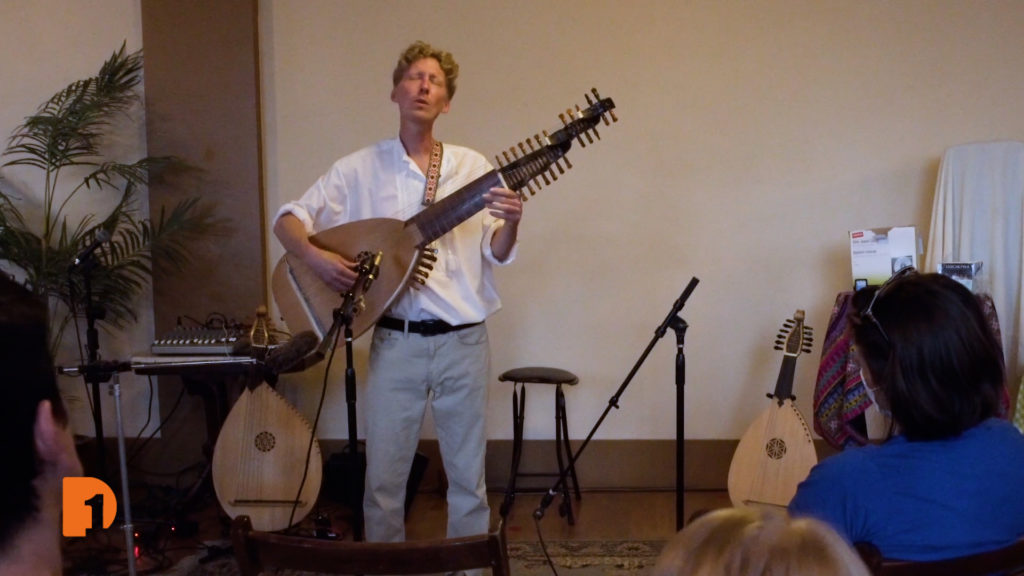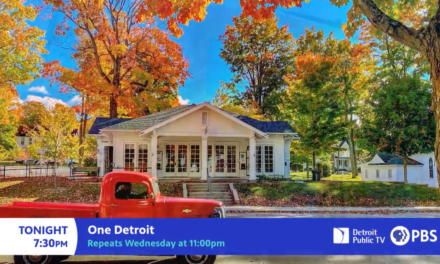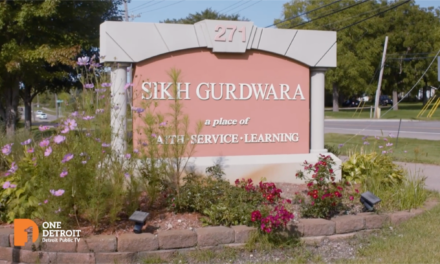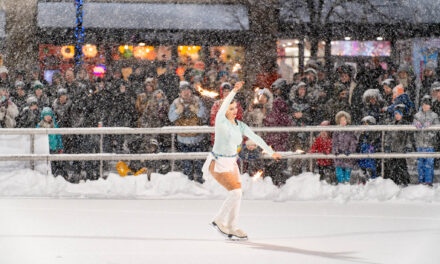As the Russia-Ukraine war continues, Ukrainians’ are fighting overseas to protect their homeland, and some like traveling multi-instrumentalist kobzar Jurij Fedynskyj are fighting to keep Ukraine’s culture alive through music and storytelling. As an American-born Ukrainian, Fedynskyj emigrated to Ukraine from North Carolina at a young age. He’s only recently returned to the states with his family, following Russia’s attacks in February.
RELATED: University of Michigan Ukrainian, Russian Music Students Organize Benefit Concert for Ukraine War
RELATED: Facing the Music: Ukrainian Quartet DakhaBrakha Continues to Speak Out Against Russian Conflict
As a modern-day kobzar, as it’s known in Ukraine, Fedynskyj has made his way across the East Coast and Midwest, as well as the war-torn cities of Ukraine, entertaining and educating people about Ukraine’s music, culture and his fight to keep both from becoming a casualty of the war.
One Detroit’s Bill Kubota sits down with Fedynskyj, following his performance at the Book Suey bookstore in Hamtramck in June, for a conversation about his experiences as a kobzar, his efforts to preserve Ukraine’s music and cultural traditions, building the instruments himself, and his plans to return home to Ukraine to continue his mission.
RELATED: Searching for Truth in Lies: Ukrainian-Americans React to Russia Conflict, Misinformation Campaign

Ukrainian kobzar Jurij Fedynskyj, a modern-day traveling musician, entertains and educates listeners about Ukraine’s cultural traditions through music at a June performance at the Book Suey bookstore in Hamtramck, MI. | Photo by One Detroit
Full Transcript:
Bill Kubota, Senior Producer, One Detroit: Jurij Fedynskyj tour, a Ukrainian storyteller here from the battlefront. Back in June, his one-man show came to the Book Suey bookstore in Hamtramck.
Jurij Fedynskyj: I take every invitation very seriously and try to make it out. These are all free events, so I don’t charge anybody anything. And I used to be a Ukrainian American, but I’m not anymore. Now I’m a Ukrainian American, Ukrainian.
[Fedynskyj singing in Ukrainian]
Bill Kubota: Fedynskyj grew up in North Carolina but emigrated to Ukraine years ago. When the Russians attacked in February, he sent his Ukrainian wife and four kids to the U.S., but he stayed as bombs fell. Carrying on with an old tradition as a Kobzar, a modern day version, traveling and singing with his custom stringed instruments, giving moral support to fellow Ukrainians.
Jurij Fedynskyj: I’m doing what the Kobzar’s did, basically playing a specific repertoire which was created to keep Ukraine Ukrainian. Right. To save our nation, our nationality, which represents our values. Who we are on a musical level, on an emotional level, basically ideal in cultural diplomacy, right a wandering musician who can go everywhere.
[Fedynskyj singing in Ukrainian]
Bill Kubota: Early this summer Fedynskyj came in to join his family, then began his American Kobzar tour.
Jurij Fedynskyj: I’m basically talking about my experience during the war. What I do during the war as a musician, reviving the lost Kobzar tradition, playing national instruments for the clubs of Andorra and for Bon. Seeing the positive results of practicing this tradition, which was destroyed in 1933 by Stalin, basically to make Ukraine a slave nation.
Bill Kubota: Fedynskyj builds these instruments himself. He says they’re easier to make than to play. The bandura, he likens that to what we know as a zither.
Jurij Fedynskyj: Because the bandura is the instrument that you don’t have to depress anything. You don’t have to fret, the Kobzas you do.
Bill Kubota: The torban like the others, but with another set of treble strings.
Jurij Fedynskyj: But these are sacred national creative instruments, which most Ukrainians don’t know. And how can that be? You know, can you imagine American singing guitar and saying what is this?
Bill Kubota: With the war on Fedynskyj’s dispatches went to Facebook. Here, he and his crew of performers shelter in the Kharkiv subway as the city was attacked.
Jurij Fedynskyj: When Putin is sending his forces to the east, right on the third month of the war, we decided that’s the place for us to be. So we got in the car with me and four of my students, and we played hundreds of concerts during that month, mostly on the eastern front. This is the cities of Kharkiv, Dnipro, Zaporizhia, Odesa, but also all points in Ukraine.
As the Blues Brothers would say, it’s a mission from God. They went with me, you know, where I told them, If you don’t want to go, I understand, you know, you might get killed.
Jurij Fedynskyj: In one point, I told them, I feel, you know, mortal danger. We very well may die. And if you want to get out, this would be a good time. It’s good that not everybody evacuated. There are still people in the cities. Putin wants us all to flee, to go to the West, and he can very simply take Ukraine and conquer it. So what do you do? It’s the spirit which defends the country.
Bill Kubota: Now, it’s August. Fedynskyj’s going back to Ukraine, his family too. Back to live, to a safe place, he says. Then he’s headed to the front to serve, as a Kobzar, again.
Jurij Fedynskyj: I’m convinced that they can’t kill me. There’s certain convictions I have in this. You might consider this craziness. It might be completely crazy. I don’t know. Music is very serious stuff is I think Woody Guthrie had on his guitar. This instrument kills fascists and it’s true. It’s true.
Jurij Fedynskyj: Internal memory. Glory to the heroes. Slow train and the cousin.
Stay Connected:
Subscribe to One Detroit’s YouTube Channel & Don’t miss One Detroit Mondays and Thursdays at 7:30 p.m. on Detroit Public TV, WTVS-Channel 56.
Catch the daily conversations on our website, Facebook, Twitter @DPTVOneDetroit, and Instagram @One.Detroit
View Past Episodes >
Watch One Detroit every Monday and Thursday at 7:30 p.m. ET on Detroit Public TV on Detroit Public TV, WTVS-Channel 56.




